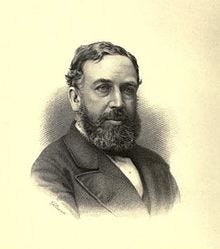Jevons' Paradox
It is wholly a confusion of ideas to suppose that the economical use of fuel is equivalent to a diminished consumption. The very contrary is the truth.
The above quotation is from William Stanley Jevons’ 1865 book The Coal Question; An Inquiry Concerning the Progress of the Nation, and the Probable Exhaustion of Our Coal Mines (they went in for long book titles in those days).
At the time he wrote his book Great Britain was rapidly industrializing. The energy resource of his time was coal. Improvements in the design of steam engines meant that the factories were using coal more efficiently. Paradoxically, this improved efficiency led to an increase in overall coal consumption because the reduced costs encouraged industrialists to increase the number and size of their factories. This paradox is now commonly referred to as Jevons’ Paradox or the Rebound Effect. It can be defined as follows.
New technologies can produce more goods from a given quantity of a resource. This allows the economy as a whole to produce more of those goods. Hence, the overall consumption of the resource increases.
Efficient Use of Fuel Increases Overall Consumption
Many of the proposed remedies for our climate problems hinge on the more efficient use of fossil fuels: oil, natural gas and coal. Yet, if Jevons’ Paradox is correct, such efforts are not only ineffective, they may actually make a bad situation worse. For example, someone may decide to reduce their greenhouse gas emissions by purchasing a smaller car. However, the gasoline or diesel that they did not purchase did not disappear — someone else will use it. Hence, there is no overall reduction in emissions. Indeed, overall emissions may actually increase because the improved fuel efficiencies will lead to increased driving. The situation becomes even worse if our well-intended driver purchases an electric vehicle (EV).
This paradoxical way of thinking explains other aspects of the dilemmas we face. For example, a normal response to freeway congestion is to build more lanes. Yet doing so may be counter-productive because real estate developers now build more homes in the suburbs. Hence the amount of traffic goes up and congestion becomes worse than it was in the first place.
The paradox even shows up in human behavior. Someone who is efficient at responding emails, for example, finds that they receive even more emails in response to the ones that they have written so efficiently. Hence their inbox does not shrink ― it grows. In the words of the proverb,
The road to Hell is paved with good intentions.
The Alternative Energy Conundrum
The use of alternative energy sources lies at the heart of most Net Zero programs. As supplies of fossil fuels become increasingly limited, and as the consequences of climate change become ever more severe, the normal response is to switch to alternatives such as wind, solar or nuclear. However, these initiatives will only work if they are matched with a corresponding demand reduction. This is not happening. In practice, renewables are supplementing, not replacing, the fossil fuels.
John Michael Greer puts it this way,
What makes Jevons’ Paradox so deadly in the present situation is that adding new sources of supply to the energy mix has the same effect as making demand more efficient. That’s why it’s inaccurate to claim, as so many badly written histories do, that oil replaced coal. More coal gets burnt each year now than was burnt each year at the peak of the coal era . . .
Carbon Capture and Sequestration
For some businesses there is no realistic substitute for fossil fuels. For example, the airline industry depends on the availability of aviation fuels. Therefore, that industry is supporting Carbon Capture and Sequestration initiatives. The basic idea is that they become carbon neutral by capturing and sequestering the amount of CO2 equivalent to their emissions.
But, once more William Stanley Jevons enters the picture. If a company sequesters say one ton of CO2 then it will be tempting for another company to use that newly created space to burn fossil fuels that create at least one ton of new CO2 emissions.
Further Insights
Although Jevons lived all those years ago, he has further insights for us now. The following words of his are totally up to date.
Reflection will show that we ought not to think of interfering with the free use of the material wealth which Providence has placed at our disposal, but that our duties wholly consist in the earnest and wise application of it. We may spend it on the one hand in increased luxury and ostentation and corruption, and we shall be blamed. We may spend it on the other hand in raising the social and moral condition of the people, and in reducing the burdens of future generations. Even if our successors be less happily placed than ourselves they will not then blame us.
The language is old fashioned, but the sentiment is totally modern. Had we acted on his advice we would not be in our current physical and moral quagmire.




